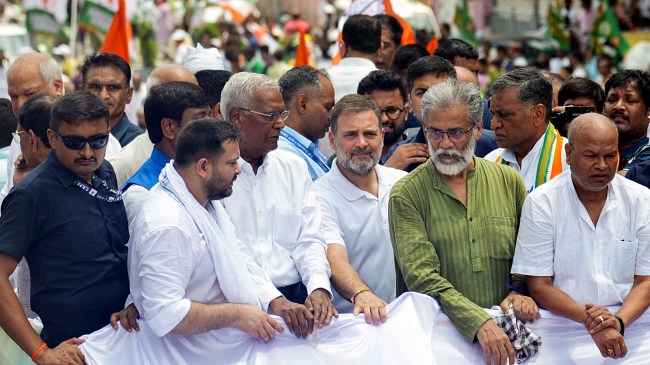Opinion Rahul Gandhi, Bihar Bandh and electoral roll revision: What is shaping Bihar politics
The INDIA bloc has warned that over two crore voters, largely from marginalised communities such as Muslims, Dalits, and migrant workers, risk exclusion due to the documentation requirements of the Bihar SIR
 Rahul Gandhi leading Bihar Bandh in Patna (Photo: PTI)
Rahul Gandhi leading Bihar Bandh in Patna (Photo: PTI) Written by Firoj Biswas
Rahul Gandhi’s visit to Bihar, alongside Tejashwi Yadav for Bihar Bandh and Chakka Jam today, has bolstered the Opposition’s narrative linking together electoral roll revision, caste census, and social justice. With rising unemployment, migration, and concerns over disenfranchisement, the INDIA bloc is reviving Mandal-era politics to consolidate Dalit, Muslim, and OBC voters to challenge the NDA.
The BJP-JDU alliance, though still banks on welfare and nationalism, its grip seems to be loosening amid demands for representation and constitutional dignity. Bihar’s youth and women — key emerging electorates — are increasingly driven by aspirations, not identity. As new forces like the Jan Suraaj seek space, Bihar 2025 is shaping into something more than just an election. It is a battle between two competing visions of democracy — entitlement versus empowerment, symbolism versus substance, ballot versus barricade.
Electoral roll revision and Bihar Bandh
The Election Commission’s stated objective is to streamline the voter list by removing duplicates and adding new voters. The Opposition alleges that the process may be used to strategically reshape the electorate. The timing and rigour of the exercise have led critics to argue that this is not merely about cleaning the electoral rolls, but about redrawing the political map in favour of the ruling BJP-led NDA.
The INDIA bloc — comprising the RJD, Congress, left parties, and the AIMIM — has warned that over two crore voters, largely from marginalised communities such as Muslims, Dalits, and migrant workers, risk exclusion due to stringent documentation requirements of the Bihar special intensive revision of the electoral rolls. These groups often lack valid identity or residence proofs, and such bureaucratic hurdles could result in mass disenfranchisement. Historically, these communities have been the core electoral base of the opposition. A significant deletion of names from the rolls could drastically weaken their vote share.
The Seemanchal region, comprising Kishanganj, Araria, Katihar, and Purnea — with a Muslim population close to 47 per cent — has become the epicentre of concern. Any dip in voter inclusion here could dramatically shift the balance in favour of the ruling alliance. The implications extend beyond Seemanchal. In eastern Bihar and adjoining Purvanchal, where many constituencies are tightly contested, a reshuffle through selective voter deletion could also harm the INDIA bloc’s prospects. The Election Commission must act transparently and ensure that no citizen is excluded due to procedural hurdles. Free and fair elections are the bedrock of democracy — any compromise here would threaten the credibility of the electoral process. Against this backdrop, today’s Bihar Bandh by the opposition is a significant political move to consolidate their voter base.
In both the 2015 and 2020 Assembly elections, more women voted than men — a powerful shift that has caught the attention of every major political party. What is driving this? One answer is welfare schemes that directly benefit households, like free cooking gas, toilets, girls’ education, and cash assistance. Women are now seen as empowered voters, not just homemakers.
While the JD(U) emphasises gender-focused programs like the Bicycle and Kanya Utthan Yojanas, the BJP engages women through self-help groups and rural outreach. The RJD, on the other hand, promises direct benefits like free education and jobs. The Congress party has launched a sanitary napkin campaign linked to women’s health and dignity. Every major party is now actively competing for the support of the woman voter.
Indeed, Bihar’s voter landscape — particularly women, youth, and first-time voters — is showing signs of breaking from conventional caste-driven loyalties. Their concerns are increasingly shaped by livelihood, education, and dignity, not just identity.
The electoral roll revision has given the opposition an opportunity to sharpen its political narratives ahead of the assembly elections. Rahul Gandhi’s leadership in the protest also portrays an image of the united opposition, months before the crucial assembly elections.
The writer is a post-doctoral fellow at Aligarh Muslim University





